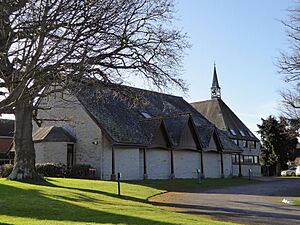Street Mission Church facts for kids
Quick facts for kids Street Mission Church |
|
|---|---|

Street Mission Church
|
|
| Religion | |
| Affiliation | Church of England |
| Ecclesiastical or organizational status | Active |
| Year consecrated | 1990 |
| Location | |
| Location | Street, Somerset, England |
| Architecture | |
| Architect(s) | Norman Cant |
| Architectural type | Church |
Street Mission Church is a special Church of England church located in Street, Somerset, England. It was built in 1990. This church stands on the very spot where an older, unique church once stood. That first church was made of iron and had been used since 1898.
Contents
The Church's Story
Why a New Church Was Needed
The Mission Church in Street was first set up as a smaller church to help the main parish church, Holy Trinity. Street was growing fast, and more people meant more space was needed for church services. So, in the 1890s, people started trying to raise money for a new, bigger church.
Reverend G. Beilby began these efforts. Later, Reverend H. L. Somers-Cocks took over. He had a plan for a new church and a rectory (the house where the rector lives). He created a special committee to help raise the money. They aimed to collect about £6,000.
Buying the Land and Building the Rectory
A piece of land was bought for £650. This was where both the new church and the rectory would be built. In 1897, work began on the rectory. The first stone was laid on August 7 by Bishop John Harmer from Adelaide. He was the brother-in-law of Street's rector. The rectory was finished the next year, costing around £1,800.
The Temporary Iron Church
Even though the rectory was finished, there wasn't enough money to start building the main church. So, the rector asked for help from the Diocesan Church Building Society. They agreed to lend the parish a temporary iron church. This type of church is sometimes called a "tin tabernacle" because it's made of corrugated iron.
The iron church cost up to £300 to buy. It was then rented to the church leaders in Street for a small yearly fee.
Opening the Iron Church
The iron church was put up on the land where the permanent church was planned. The Bishop of Bath and Wells, George Kennion, officially opened it on February 5, 1898. By this time, the church fund had about £1,800. Most of this money, £1,100, had been raised by people in Street.
However, they still needed £700 to pay off the debts for the land, the rectory, and the iron church. In June 1898, the Wells Journal newspaper reported that the iron church was already helping a lot in the fast-growing town.
Building the New Church
The iron church ended up serving the community for most of the 20th century because there weren't enough funds to build the planned permanent church. By the 1980s, the iron church started having serious problems. It needed major repairs.
So, a new fundraising campaign called "Mission Possible" was started. This campaign successfully raised an extra £100,000. This money was added to the funds they already had. Norman Cant drew up the plans for the brand new church. The plans were approved in 1987. The very last service in the old iron church was held on December 31, 1989.
The New Church Is Built
The first stone for the new £300,000 church was laid on March 29, 1990. This was done by the Bishop of Bath and Wells, George Carey. By then, most of the money needed had been raised. About £105,000 came from selling the old mission rooms (which used to be a school) and some land. Another £80,000 came from legacies (money left in wills). Donations added £60,000, and the diocese gave £25,000.
The old mission rooms were turned into two flats. The land was used to build two new houses.
The completed church was officially opened on November 7, 1990. Bishop Nigel McCulloch of Taunton led the dedication service, helped by Archdeacon Ted Thomas. The new church was built using a type of stone called Blue Lias. It even includes the bell tower from the old iron church. Many of the old church's furnishings and the organ were also moved into the new building. The new church can hold 250 people.
 | Lonnie Johnson |
 | Granville Woods |
 | Lewis Howard Latimer |
 | James West |

